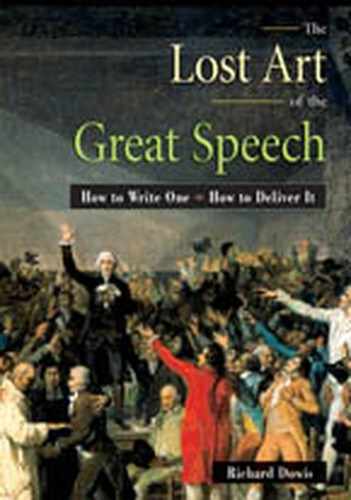The power of simplicity
Using the language well in a speech often means using the strong, simple words that compose our everyday language. To illustrate the power of simplicity, I want to share with you something I composed for use in the Members' Handbook of the Society for the Preservation of English Language and Literature (SPELL):
You don't have to use long words when you speak or write. Most of the time, you can make your points quite well with short ones. In fact, big words may get in the way of what you want to say. And what's more, when you use short words, no one will need to look them up to learn what they mean.
Short words can make us feel good. They can run and jump and dance and soar high in the clouds. They can kill the chill of a cold night and help us keep our cool on a hot day. They fill our hearts with joy, but they can bring tears to our eyes as well. A short word can be soft or strong. It can sting like a bee or sing like a lark. Small words of love can move us, charm us, lull us to sleep. Short words give us light and hope and peace and love and health—and a lot more good things. A small word can be as sweet as the taste of a ripe pear, or tart like plum jam.
Small words make us think. In fact, they are the heart and the soul of clear thought.
When you write, choose the short word if you can find one that will let you say what you want to say. If there is no short word that does the job, then go ahead and consider the utilization of a sesquipedalian expression as a viable alternative, but be cognizant of the actuality that it could conceivably be incumbent upon many of your perusers to expend, by consulting a dictionary or perhaps an alternative lexicon of particularized patois, copious amounts of their invaluable time in attempting to determine the message you are endeavoring to impart to them through the instrumentality of your missive.
The passage you've just read contains 310 words. The first 231 are all words of a single syllable. The first word that has more than one is ahead. After that, I packed into the passage as many long, fuzzy words as I could think of.
Contrary to what some people seem to believe, the ability to use language well does not mean the ability to come forth with long words like cognizant, incumbent, and instrumentality. Now, I'm all for having a large working vocabulary. Learning words can be very satisfying and life enriching, but . . .
Good writers and speakers know the power and grace and eloquence of simplicity. Some of the most eloquent and powerful words ever written are some of the simplest. Consider, for example, this well-known passage from the Book of Ecclesiastes:
I returned, and saw under the sun, that the race is not to the swift, nor the battle to the strong, neither yet bread to the wise, nor yet riches to men of understanding, nor yet favor to men of skill; but time and chance happeneth to them all.
Orwell rendered that Biblical passage in what he facetiously called "modern English" to show how power, grace, and even meaning can be lost through unnecessarily complex language:
Objective consideration of contemporary phenomena compels the conclusion that success or failure in competitive activities exhibits no tendency to be commensurate with innate capacity, but that a considerable element of the unpredictable must invariably be taken into account.
Notice how the strong, simple, concrete words and phrases of the original passage have become vague concepts in Orwell's "modern English" version. "I saw" in the original has become "objective consideration of contemporary phenomena" in Orwell's revision. "Race, " "bread," and "battle" are "competitive activities, " and "time and chance" has become "a considerable element of the unpredictable."
The most memorable lines from the great speeches, some of which you have read in this book, or will have read by the end of the book, are often the simplest. For example:
General Douglas MacArthur's "Old soldiers never die."
William Jennings Bryan's "You shall not crucify mankind on a cross of gold."
Abraham Lincoln's "I do not believe this government can endure, permanently half slave and half free."
Franklin D. Roosevelt's "The only thing we have to fear is fear itself."
John F. Kennedy's "The torch has passed to a new generation of Americans."
Martin Luther King, Jr.'s "I have a dream."
And Ronald Reagan's "How can we not believe in the greatness of America?"
Ralph Waldo Emerson wrote, "An orator or author is never successful until he has learned to make his words smaller than his ideas." Compare the size of Churchill's ideas with the size of his words in this passage from one of his speeches:
We shall not flag or fail. We shall go on to the end. We shall fight in France. We shall fight on the seas and oceans. We shall fight with growing confidence and growing strength in the air. We shall defend our island, whatever the cost may be. We shall fight on the beaches. We shall fight on the landing grounds. We shall fight in the fields and in the streets. We shall fight in the hills. We shall never surrender.
Of eighty-one words in that excerpt, only nine have more than one syllable. Only four have more than two.
